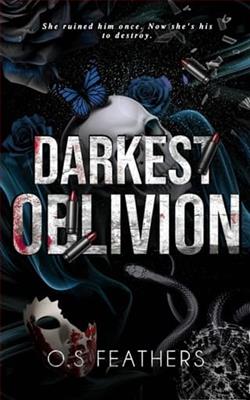Page 16 of The Marriage Debt
Alessio heads in first. Rafe waits until I step out before following. He checks the sidewalk and the corners, nods once, then takes his place near the entrance. Inside, the dining room smells faintly of burnt coffee grounds and cleaning solution. Chairs are still stacked on most of the tables. The barista isn’t here yet.
Dario Spinetti waits at a two-top near the back, sweating into the collar of his too-fine shirt. He's breathing too fast, eyes flicking around. Anton’s preferred banker knows I’m not here to waste time.
His hands are already on the folder when I reach the table. He rises halfway, unsure whether he should stand or not. I don’t bother acknowledging it. Alessio sits across from him, leaving the seat beside me open. Rafe doesn’t sit. He posts up against the back wall, arms crossed.
Dario clears his throat and opens the file. “We found the flagged movement last night. Final transaction from the Luxembourg account registered to Anton. It moved one point two million through a Naples-based shell company. The account closed hours later.”
He pushes the paper forward. Alessio’s already circled the entity name. My eyes scan the routing chain. It’s clean, layered through enough fronts to slow most people down. Not us.
“Who owns it?” I ask.
“The shell is tied to a holding firm registered under Giulio Fontana. He’s on the Bianchi payroll.”
“Device?”
“Remote. Password-authenticated, but not from your brother’s equipment. IP puts it in Milan, spoofed through two proxies.”
Of course. Clean enough to pass if no one’s looking. Too confident if someone is.
“And the other activity?”
Dario flips to a second sheet. “Scattered withdrawals over the last six months. Low volume. Different shells. No patterns—until this one. Last move before zero.”
I sit back, keeping my face still. The problem isn’t how they pulled the money. It’s that they did it days before Anton ended up with a bullet through his mouth.
“And the half-million Lila took?”
“She moved that the morning after his death. Accessed everything she had codes for. Consolidated it into a Cayman account registered in her maiden name.”
Good. She knew the clock was running out. The money is hers, so I can’t fault her for taking it. Better her than the Bianchis.
I close the folder and tap my knuckles once against the tabletop. “Trace the Naples branch. I want the internal approvals, device logs, timestamps, and employee movement for the last two weeks. Pull access rosters, security footage, anything they archived. Start with the manager. Work your way down.”
Alessio nods, already pulling his phone from his jacket pocket.
Dario hesitates. “If we dig that deep, they’ll see it coming. The branch will report the audit immediately.”
“That’s the idea. I want them looking over their shoulders before we get there." Fear makes people move. Makes them sloppy. If they think we’re digging, they’ll start cleaning—erasing names, shifting money, pulling strings. And in that panic, they’ll show me who’s still alive on the inside. Who pulled Anton’s accounts apart while he bled out. I don’t want silence. I want movement. I want to watch them scramble to cover the trail they think they buried six months ago.
Let them see it coming. Let them know I’m not just tracking the money. I’m coming to collect.
We leave the café just after nine. Traffic has started to build, but not enough to slow us down. The city blurs past the windows in soft streaks of gray and gold. I make a few calls. Push two shipments forward. Sign off on a new distribution route Anton never got around to approving. Nothing about the day feels off, but I can’t shake the quiet undercurrent in my head.
They emptied his accounts like they knew no one would come looking. But I came anyway. I spend the rest of the day in the city, moving from one meeting to the next. I check on a warehouse we’ve had eyes on for weeks. Walk a construction site we’re using as cover. Sit down with a man behind on payments and explain why that won’t happen again. One of Anton’s old contacts wants to renegotiate terms—he leaves the conversation with the same terms and less pride. No one asks questions. No one wastes time. I don’t stop long enough to eat.
By late afternoon, the estate is still and low-lit. Most of the staff are gone, lights dimmed. I spend a few hours in my office sorting through procurement figures, taking notes on what needs to shift now that Anton’s mess is on my desk for good. It’s quiet work. Nothing urgent—until Alessio walks into my office. He closes the door behind him and drops a folder on the edge of my desk and sits down across from my desk, waiting for me to look up. I don’t ask. He knows I hate being interrupted unless it matters. I finish reading the last few lines of the import manifest in front of me, then move it aside.
“It’s done,” he says.
I open the folder.
First image, the car—early model, black, window halfway down, parked just outside a train station on the southern edge of Naples. Second image, Pasquale D’Amico. Slumped against the steering wheel, head tilted forward, two entry wounds just behind the ear. The blood covers the seat, the dash, and most of the interior door panel. His left hand is still curled like he saw it coming too late.
It’s messier than I expected. A point-blank double-tap in a parked car always is.
“Time?” I ask.
“Between seven and nine this morning. Gas station attendant reported it after seeing blood on the windshield. No one got close. The windows were fogged. Engine off. Phone stripped. SIM melted under the seat.”















